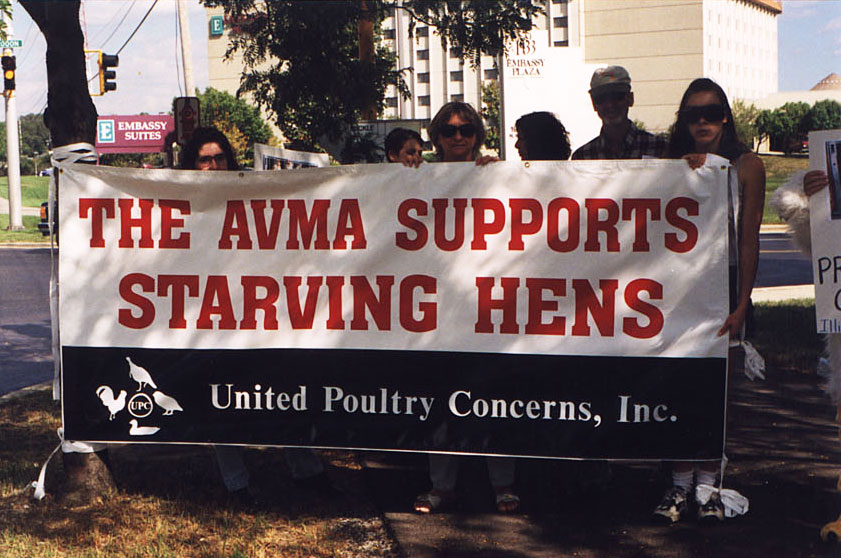Action Alert
American Veterinary Medical Association Continues to Support Forced Molting
For the 4th time, the AVMA rejected a resolution presented by the Association of Veterinarians for Animal Rights that called for a position statement against forced molting by food deprivation. In the United States, 70% of laying hens are starved from 4 to 21 days to manipulate the economics of egg production. Unlike the Canadian Veterinarian Medical Association, the AVMA supports this cruelty which is so severe it impairs hens' immune systems making them prey to Salmonella enteritidis infections and intestinal inflammation and drives them to consume each others' contaminated feathers (Peter S. Holt, Avian Diseases, 1995, Vol. 39: p. 248).
According to poultry specialist Dr. Ian Duncan at the University of Guelph in Ontario, during forced molting, "mortality increases dramatically" and "hens suffer enormously." Chickens, he says, "have evolved to forage and consume food throughout the day. Consequently, deprivation of food acts as a drastic stressor" (Journal of Applied Animal Welfare Science, 2001, Vol. 4, No. 3: 209).

Photo by Illinois Animal Action
What Can I Do?
Ask the AVMA why they support forced molting by food deprivation despite their oath to "use my scientific knowledge and skills for the benefit of society through the promotion of public health, protection of animal health, and the relief of animal suffering." Request a written reply. Contact:
Bruce Little, DVM, Executive DirectorAVMA
1931 N. Meacham Rd, Suite 100
Schaumburg, IL 60173-4360
No Accountability Invites Cruelty
The egg industry has known for decades it could achieve the same production results by feeding hens an altered diet and reducing the hours of artificial light from 17 to 8, instead of starving them, but since feeding the birds costs money and starving them doesn't, and since no one was looking over industry's shoulder and no federal welfare laws protect poultry in the United States, the industry chose starvation. However, as the link between food deprivation and diminished immunity, predisposing hens to Salmonella enteritidis infection, was added to the bad publicity about the cruelty of forced molting in the 1990s, industry and government started funding new studies to "find alternatives" to the molting of hens by food deprivation. All of these studies pit experimentally food-deprived hens against hens on experimental diets to compare the results. Meanwhile the "results" are already known.What Can I Do?
- Ask United Egg Producers how their practice of starving hens for 1 to 3 weeks fits with their March 2002 statement that "There is no excuse for any Producer not providing feed for their animals."
- Urge an End to Battery Caging, Debeaking, Forced Molting, and Live Burial of Hens.
Always request a written response.
Write to:Albert E. Pope, President
United Egg Producers
1720 Windward Concourse, Suite 320
Alpharetta, GA 30005
Ph: 770-360-9220
Fax: 770-360-7058
Email: info@unitedegg.org